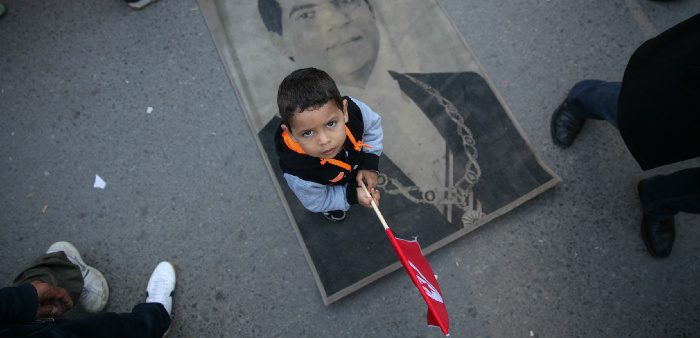Tunisia’s Disappointed Hopes
Within and beyond the Arab World, many see the Maghreb’s smallest country as a beacon of hope. Tunisians themselves aren’t so sure.

Tunisians celebrate the fifth anniversary of the revolution, Tunis, January 14, 2016. Chedly Ben Ibrahim/Demotix/Corbis
On January 14, 2016, Tunisians commemorated the fifth anniversary of their revolution without much enthusiasm. Though they often are told that their revolution represents “all that remains of the Arab Spring”, they know that the revolution has failed to achieve its goals and has not fundamentally changed their lives.
Tunisia is sinking deeper into an economic crisis, exacerbating both unemployment and the fragile condition of the country’s interior and southern regions. The rupture with the past wasn’t carried out entirely and democratically elected political leaders have proven their inexperience. The immense joy that followed President Zine El-Abidine Ben Ali’s departure has given way to profound disillusionment.
Immediately after Ben Ali’s departure, Tunisians began calling the uprising their thawra, or revolution. In a vast wave of solidarity, the term reproduced itself across the Arab World. It expressed the magnitude of events. This small country became known as the cradle of revolutions in a region long known for political stagnation and resistance to change.
The uprising raised huge hopes for change. At the time, Tunisians dreamed of an improvement in living conditions. They also believed that after overthrowing the dictator, liberty was within grasp and absolute equality would reign among those who had demanded loudly and clearly the need for dignity. These illusions were supported by perceptions of their “revolution” outside of Tunisia. After all, wasn’t theirs the only one not to have failed?
Despite the desire to believe so, the hard reality plunged Tunisians into disappointment as hoped for changes didn’t happen. The economy stalled; the growth rate in 2015 was 0.5 percent, which is far too low to create new jobs. Unemployment increased and some young Tunisians who couldn’t find any career prospects at home joined the ranks of the “Islamic State” in Syria or Libya, before returning to carry out attacks in their own country. Tunisia became the world’s leading exporter of jihadists going to fight abroad.
Other anticipated changes have also not come about. The same judges as under Ben Ali still render “justice”. The media hasn’t really changed, and even in politics there is a conservatism recalling a period thought to have ended. The large number of political parties founded in 2011 have made way for two large blocs occupying the political field: Nidaa Tounes, which in many ways is a continuation of the party in power under Ben Ali (the Democratic Constitutional Rally, DCR), and Ennahda, which was previously an underground movement. This conservatism is accompanied by moral policies often at odds with the 2014 Constitution’s Article 2 on individual liberties. Laws on homosexuality and cannabis use that allow for imprisoning youth after public humiliation are part of this.
Public life, which was supposed to be the work of all, has become illegible for the majority of people. Tunisia, a country which had torn itself apart over two social projects regarded as irreconcilable (Islamist and “modernist”), now watches as the two political camps act in concert. The country also sees that the process of breaking with the old regime has been put on hold: the democratically elected President Caïd Essebssi rehabilitated Ben Ali’s political lieutenants, before naming his own son as the head of Nidaa Tounes, the party founded in 2012 to fight the Islamist party Ennahda. Didn’t the revolution erupt because people wanted to put an end to nepotism, the old regime and its practices?
Still, is it fair to consider the revolution and following transition a failure? The achievements of 2011 are important: Tunisia has gained a constitution citing the civil nature of the state and which puts men and women on equal footing under the law. The constitution has given freedom to expression and stipulates democratic and free elections. In the summer of 2013, when the political crisis was at its peak, civil society forced the resignation of politicians who had been democratically chosen, punishing those same leaders for their bad governance. The result was the National Dialogue Quartet, which won the Nobel Peace Prize. And yet, civil society today is showing signs of fatigue and is less active than before. More than ever before, it must remain vigilant as the security climate and economic problems push into the background questions of individual liberty and, more generally, the fundamental demands of the revolution.
This article was translated from the French by the Cairo Review.
Khadija Mohsen-Finan is an associate professor at the University of Paris I (Panthéon Sorbonne) and associate researcher at the Institute for Strategic and International Relations in Paris. She is a founding member and contributor to the online journal Orient XXI.

